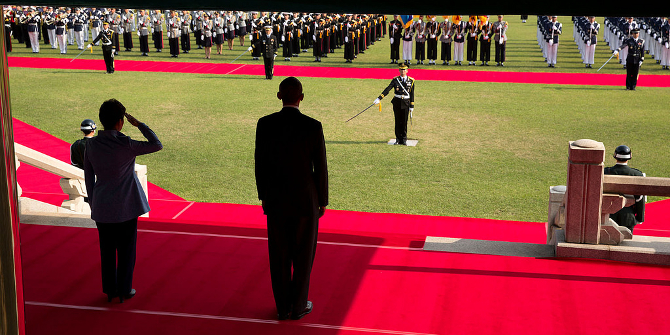 As the 2016 Republican primary campaign has unfolded, Donald Trump’s foreign policy positions, which question US alliances and commitments overseas, have been met with concern and disbelief by many foreign policy commentators. Nicholas Kitchen writes that these reactions should be seen in the context of a US foreign policy establishment which sees the US still playing the role of actively promoting liberal values such as democracy and free trade across the world. He argues that Trump’s questioning of traditional US foreign policy may reflect an American public which has become tired of supporting US liberal hegemony, opening up the space for wider (and better informed) discussion about America’s role and international leadership.
As the 2016 Republican primary campaign has unfolded, Donald Trump’s foreign policy positions, which question US alliances and commitments overseas, have been met with concern and disbelief by many foreign policy commentators. Nicholas Kitchen writes that these reactions should be seen in the context of a US foreign policy establishment which sees the US still playing the role of actively promoting liberal values such as democracy and free trade across the world. He argues that Trump’s questioning of traditional US foreign policy may reflect an American public which has become tired of supporting US liberal hegemony, opening up the space for wider (and better informed) discussion about America’s role and international leadership.
Donald Trump has caused quite a stir among the United States’ foreign policy establishment with his questioning of America’s alliance commitments, obligations that, according to three former US foreign policy officials now resident at the Center for Strategic and International Studies, he ‘doesn’t understand’. Washington has been out in force in response to Trump’s comments on NATO, Korea and Japan, defending the value of United States’ global security commitments (see here, here, here and here).
In some sense this reaction is rather strange. Yes, Trump has an uncanny ability to make headlines and drive the media agenda. But given his lack of foreign policy expertise – and the paucity of his so-called foreign policy advisers – one would think that Trump’s comments would have been laughed off by the Beltway think tankers, officials (and academics) that for decades have been revolving into and out of administrations, creating and reinforcing America’s basic foreign policy consensus.
That consensus – around free trade, command of the commons, and selective military intervention – commits the United States to a global posture. Sure, there are variations on the theme, around the level of commitment to democracy promotion, and the utility of particular international institutions, but the basic tenets of American grand strategy are now so embedded as to be assumed. Whilst some saw the ‘neoconservative moment’ of the early 2000s as a radical departure for US foreign policy, George W. Bush’s first term foreign policy team were distinguished from the liberal internationalist mainstream – those who believe that states should intervene in other countries to promote liberal objectives such as democracy and free trade – on a few details of means rather than the goals of US grand strategy (and even on a policy as internationally controversial as Iraq). For evidence of the limited bandwidth of the US foreign policy establishment just compare the reports of the liberal internationalist Princeton Project and the neoconservative Project for a New American Century: both rest on the idea that America and the world are best served by the United States playing the role of liberal hegemon.

So what explains the almost panicked reaction of Beltway insiders? Well, there’s certainly a case to be made that the possibility that Trump may make it to the White House is making America’s allies nervous, something that is not conducive to the United States getting what it wants to get done in the world. President Obama has said as much publicly, and it’s pretty much the first words out of the mouths of diplomats and foreign policy officials here in London. It would be safe to assume that US officials are getting some rather awkward questions from every single one of Washington’s 53 collective defense partners, not to mention the dozens of other states that have security assistance relationships.
But there is a deeper concern as well, of which Trump is a symptom rather than the cause. It may be that the American public is no longer prepared to support the liberal hegemony advocated by the foreign policy establishment. The case for retrenchment is being remade, and not just in the ‘America First’ rhetoric of Trump – a label which casts worrying historical allusions for American internationalists. Serious thinkers have begun to question the value of America’s global posture. Steve Walt of Harvard bangs this drum virtually every week on his Foreign Policy blog. MIT’s Barry Posen, a leading authority on military doctrine, has (literally) written the book on a grand strategy of Restraint. The voices of offshore balancers like Christopher Layne and Andrew Bacevich are increasingly being heard.
The last time the debate around American grand strategy was so open was in the early 1990s, when a ‘Kennan Sweepstakes’ was underway in the challenge to define the replacement for anticommunist containment. Then, as now, anti-internationalism and foreign affairs bashing prevailed on the hustings and in Congress. Then, as now, it was ‘the economy stupid’ that was the priority of the American people. In the race to be the Democrats nominee Paul Tsongas argued for defense cuts and Pat Buchanan’s strong showing in the Republican primaries effectively opened the door for Ross Perot’s independent campaign.
For the foreign policy establishment there was even nostalgia for the Cold War. Sociologically this is unsurprising: we all get attached to our particular subject, and tend to elevate it in importance above everything else. Roland Steel, writing in 1995 of the Temptations of a Superpower, went so far as to accuse foreign policy experts of being ‘suckers’ for notions of ‘credibility’ and ‘leadership’. This is a view apparently shared today by Barack Obama, who we recently learnt ‘secretly disdains’ the ‘Washington playbook’ that ‘makes a fetish of ‘credibility’’.
Whilst the President is no believer in dismantling America’s security commitments – and no realist, for that matter – his willingness to push back against the ‘do stuff’ assumption of the DC foreign policy community has put the pressure on. In the early 1990s, advocates of a more limited role in the world complained at being labelled isolationists, and their views dismissed out of hand, as Clinton’s National Security Advisor did in a major foreign policy speech, as “the rhetoric of Neo-Know-Nothings”. Today, that term of opprobrium is again being revived for the same purpose, and realists are once again eager to distinguish a grand strategy of retrenchment from Trump’s parochial nationalism. That they feel they have to do so reflects badly on the quality of debate, and about the willingness of some to caricature serious arguments about the nature and scope of American grand strategy. Donald Trump really may not understand America’s alliances, but increasingly, those who really do share some of his positions. It’s a debate worth having again.
Please read our comments policy before commenting.
Note: This article gives the views of the author, and not the position of USAPP – American Politics and Policy, nor of the London School of Economics.
Shortened URL for this post: http://bit.ly/23oY2cd
_________________________________________
 Nicholas Kitchen – LSE US Centre
Nicholas Kitchen – LSE US Centre
Nicholas Kitchen is Assistant Professorial Research Fellow in the United States Centre. He is Executive Director of the LSE Diplomacy Commission, and leads the LSE IDEAS Power Shifts Project together with Michael Cox and Danny Quah. He is also Treasurer of the US Foreign Policy Working Group of the British International Studies Association.






